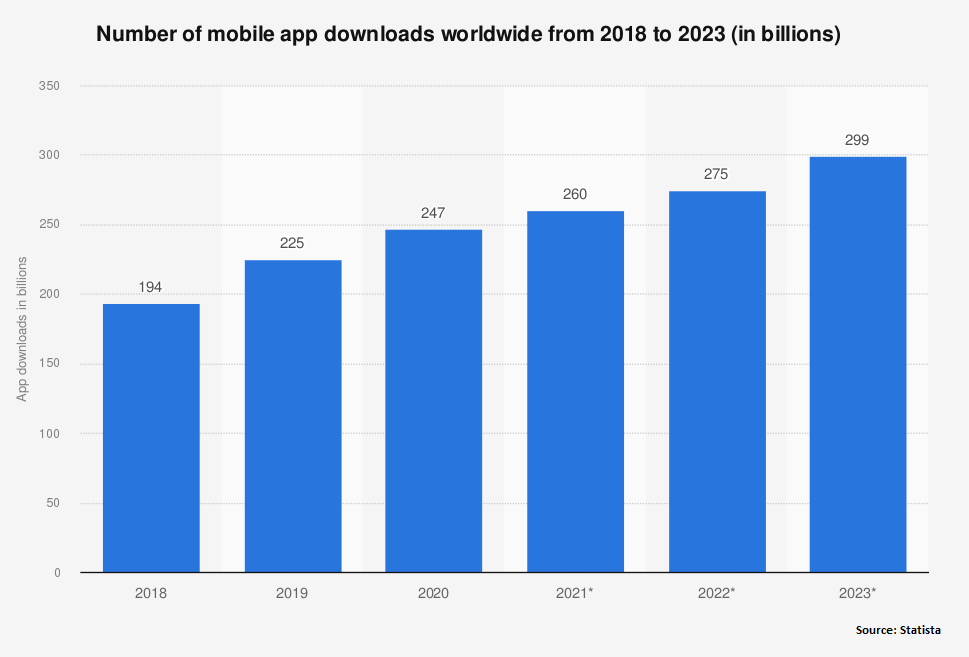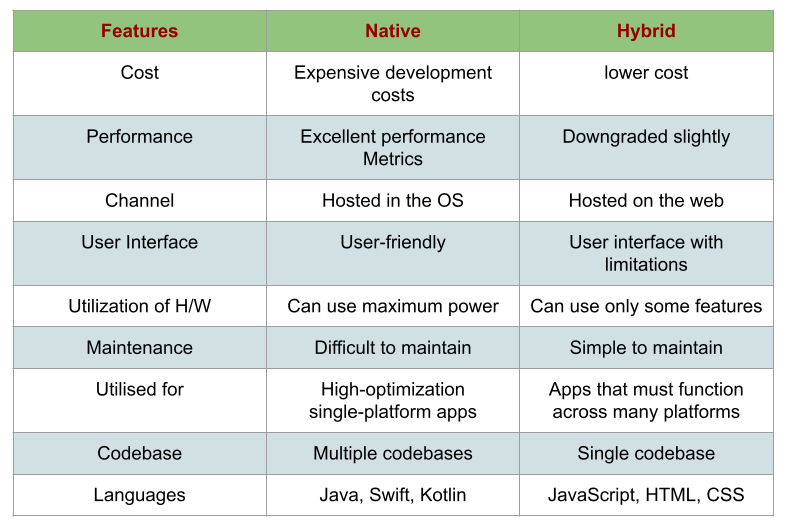The mobile industry is a huge one that is continually growing. Smartphones have become extremely useful in the modern era, providing numerous benefits such as instant communication via e-mail and social networking, web browsing, entertainment, GPS, and various other mobile applications. Therefore, a common dilemma arises when deciding whether to create a native app or hybrid app.
Before we analyze the differences, let's first examine how each of these types of apps differs, followed by the advantages and disadvantages of each. Then, we'll discuss in more detail native app vs hybrid app development and provide some insight into which approach is ideal for specific requirements.
Native app vs Hybrid app: Key questions
It's best practice to ask yourself some key questions before deciding the difference between a native and hybrid app.
- Are you creating the app for a client, yourself, or your employer?
- What is the budget for development?
- How soon does it need to go live?
- Who is the primary audience?
- What features must be present?
The annual number of app downloads globally is expected to reach around 299 billion in 2023, up from approximately 247 billion global app downloads in 2020.

With such intense competition, business owners are under pressure to focus more on the quality, accuracy, features, and other variables that convince potential customers to choose their services over others. At this point, businesses usually face some dilemmas, such as deciding on the best technology for mobile app development services, whether to go with iOS or Android, or which app development framework to use to increase customer engagement.
Apps are excellent for increasing awareness and giving your customers extra value. For this reason, the majority of enterprises choose a mobile app solution. But there is no straightforward answer to the discussion between native apps and hybrid apps, which has been going on for a while. Innoraft, the best mobile app development company in India, has a team of experts, including professional mobile app developers, to assist you in getting your app developed and live on the application store on time and within budget, with no bugs or issues.
Let's start by briefly explaining what native and hybrid app development are in simple terms.
What is Native App Development?
Native apps are designed specifically for a platform. Native app development creates apps or software that must run on specific devices and mobile app platforms like Android and iOS. As a result, a native mobile app developed for Android will never work on iOS, and vice versa. Native mobile app development complies with specific guidelines to improve the user experience. Developers can create apps that take advantage of an operating system's features. Native apps entailed the development of separate apps for each platform. So, developing native apps may take more time and money.
The development of native applications on Android and iOS involves different frameworks.
iOS makes use of:
- Objective-C: A programming language with excellent development support and many libraries. It also works with other programming technologies.
- Swift: Swift is Apple's new programming language that replaces Objective C. It also outperforms Objective-C in terms of performance. All the latest applications now use Swift due to its immense power and smoother user experience.
Android makes use of:
- Java: This programming language is used for mobile apps and desktop & web development. It gives developers a powerful library to access the various Android OS features.
- Kotlin: This programming language was created specifically for Android and works with Java. Kotlin is supported by Google for Android development and is available as an alternative to the Java compiler in Android Studio. Kotlin shortens the programming time required for application development.
Advantages of Native App Development
- Improved User Experience: Native apps can better use offline mode features. In addition, focusing on a specific platform enhances the app's efficiency. Each of these elements works together to improve the overall user experience.
- Enhanced Performance: High-performance metrics are used when an app is coded for a specific operating system. It's due to improved storage and memory optimization obtained through code. Native mobile apps are also easier to update and maintain.
- Increased Security: Native app development relies on various browsers & technologies, such as HTML5, JavaScript, and CSS, to ensure complete data security on the user's end.
- Functionality: Native mobile app development provides access to the most recent features as soon as they are released, allowing developers to integrate them quickly into the app.
- Reduced Bug Scope: Handling two different codebases becomes more complicated than managing a single codebase, as in native app development. However, because native apps have a single codebase and do not rely on cross-platform tools, they have fewer bugs.
Disadvantages of Native App Development
- Cost: The cost of native mobile app development increases in conjunction with their complexity. The need for excellent resources and experienced developers elevates the overall cost of the process.
- Time-Consuming: It takes longer because you must develop applications separately for both platforms. Developing a single native mobile app takes longer than a hybrid mobile application.
What is Hybrid App Development?
A hybrid app is a single app that can operate on different operating systems like iOS, Android, & Windows and integrates web and native development elements. The application is written in web technology languages such as HTML, CSS, and JavaScript before being condensed into a native application. The plugins, such as Ionic's Capacitor, Apache Cordova, and others, allow access to native functionalities.
With hybrid mobile app development, the code is written only once and can be used across multiple platforms. As a result, when you create a hybrid application, it can provide a user experience and performance that are nearly equivalent to those of native apps, but it falls short in terms of UX and navigation patterns.
The following are the three most popular frameworks for hybrid web applications:
- React Native: It is an open-source, cross-platform compatible software created by Facebook. It has a simple user interface, high performance, and quick development times.
- Xamarin: Microsoft maintains and strongly supports this open-source framework. Xamarin is appropriate for simple applications and is easy to maintain. It is typically used for commercial projects.
- Ionic: Ionic develops mobile apps using JavaScript, CSS, and HTML technologies. It is simple to learn and use but challenging to keep up with. Unfortunately, the appearance of Ionic faded with the advent of React Native.
Advantages of Hybrid App Development
- Available on Multiple Platforms: As hybrid applications do not need to develop different codes for each platform, they can run on iOS and Android with the same base code.
- Saves time: One piece of code will work on both the iOS and Android platforms. A hybrid mobile app developer only has to work on one code, saving time.
- Simple to Maintain: Since only one base code exists, updating the program is simple. The user does not need to download the most recent version to fix a bug.
- Reduced cost with ease of development: Since hybrid application development is backed by unified development, startups with limited budgets can ultimately relax. They do not need to invest separately in developing different versions of applications for other platforms. Instead, a hybrid mobile application development framework allows developers to create a single version and use it across multiple platforms.
Disadvantages of Hybrid App Development
- No Offline Assistance: Hybrid applications, unlike native apps, do not provide offline support. Users must wait for an Internet connection before using the app's features.
- Improper User Interface: Several functions are impeded because the interface must be compatible with both platforms. The user interface in hybrid apps is not as strong as in native apps.
- Inconsistencies in the OS: Since hybrid apps use a single code base, there may be features specific to one operating system that needs to be fixed on other systems, such as some Android-specific features that do not operate on iOS devices.
So these were the pros and cons of native apps and hybrid apps. Both have a reasonable number of advantages and disadvantages. However, hybrid app development lacks high performance, whereas native app development requires constant updates from users. We'll move on to the next section to measure the difference between native and hybrid app.
What is the Difference Between Native App and Hybrid App?
The native app vs hybrid app comparison is performed for various criteria. Some differences between native apps and hybrid apps are noticeable and easily recognizable. However, some substantial differences between native and hybrid app occur during the application development process.

A business can determine the benefits of native apps and hybrid apps by comparing all these differences.
Native app vs Hybrid app Examples
Examples of Native App
The native app examples will include applications in various categories, including business applications, games, and messaging services.
- Spotify
- Google Maps
- Artsy
- Pokemon Go
- Waze
- Tesla
- SoundCloud
Examples of Hybrid App
These great hybrid apps show that a multi-platform framework can deliver performance on par with native apps.
- Evernote
- Gmail
- JustWatch
- Remote POS
- Uber
- Amazon App Store
- Airbus Helicopters
Conclusion
Companies need to use a business app development method that meets their business operations, requirements, and client expectations, irrespective of the industry vertical they are dealing with. Therefore, after reviewing the business specifications, it is recommended that you discuss them with application developers, who will shape your ideas in the best way possible.
Every approach has advantages and disadvantages when comparing native apps to hybrid apps; you have to consider the larger picture and be aware of the goals you want to achieve with the application. Rather than having a permanent in-house setup, you can also outsource application development because working with a mobile app design company would simplify the process.
